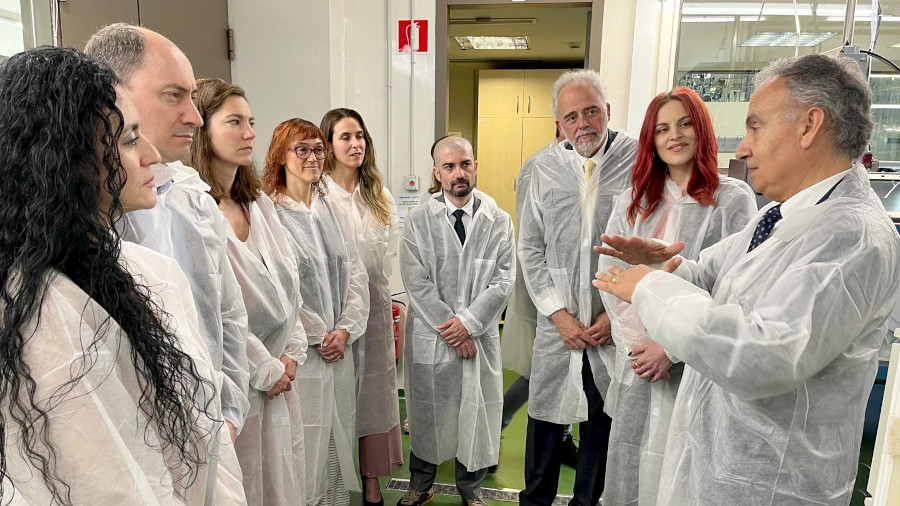30th anniversary of the UAB's MELiSSA laboratory
In 1995 the MELiSSA laboratory was opened at the UAB Faculty of Science, a unique initiative in all of Europe to demonstration and integrate life support technologies in space. In celebration of its 30th anniversary, on 6 June the MELiSSA Pilot Plant, located since 2009 at the School of Engineering, held an event that included the participation of over 100 attendants.

The celebration of the 30th anniversary of the MELiSSA laboratory was held at the UAB on Friday 6 June, at the MELiSSA Pilot Plant facilities and in the Sala de graus of the School of Engineering. The event brought together more than a hundred attendees linked to the project and was attended by prominent personalities, such as Minister for Research and Universities Núria Montserrat of the Government of Catalonia. Minister Montserrat expressed the support of the government to a project of these characteristics “collaborative, international and aimed at solving major challenges of energy transition, sustainability, food and space exploration”, as well as “the pride and gratitude of having in Catalonia this ecosystem in space research”. “Catalonia wants to become one of the 50 most innovative regions in Europe, and that implies the creation of new programmes in the area of space,” he announced.
Chloé Audas, MELiSSA project manager at the European Space Agency (ESA), also participated and presented the initiative from the agency's global vision. The project includes 16 partners from six countries, from universities, research, industry and other organisations, with more than 1,500 scientists and engineers involved. It is a project “to respond to the need to have a closed life support system for space missions,” she said, and now the necessary step will be “to include humans in this cycle, a fundamental step to test the operability, the maintenance of the cycle and the redundancy” of the processes.
Francesc Gòdia, professor del Departament d'Enginyeria Química i Ambiental de la UAB i director de la Planta Pilot MELiSSA, va explicar la trajectòria del projecte al llarg d’aquests 30 anys, tot agraint el suport continuat de la UAB, de l’ESA, de la Generalitat i del govern de l’Estat “en sintonia fina” des dels inicis. “Tenim la visió de mantenir un humà aïllat per demostrar que aquesta tecnologia pot suportar la vida d’una persona a l’espai”, va refermar el professor Gòdia com a fita per als propers deu anys.
Per la seva banda, la directora de la divisió d’Òptica, Robòtica i Ciències de la Vida de l’ESA, Kyriaki Minoglou, va destacar el laboratori MELiSSA com a una “eina excel·lent per empènyer els límits de la ciència i les seves aplicacions”, i va recordar que és un dels dos laboratoris externs de l’Agència Espacial Europea a Espanya, juntament amb el telescopi OGS a les Illes Canàries.
La jornada també va comptar amb la participació de l’astronauta espanyola Sara García Alonso, per a qui “MELiSSA és més que una planta pilot, és un assaig per a un futur on la biotecnologia serà una eina per mantenir la vida”. García Alonso va compartir que sovint posa com a exemple un projecte de l’ESA basat en la tecnologia de MELiSSA quan és preguntada per la importància de la recerca espacial. Es tracta d’un projecte que s’està aplicant per ajudar a reduir la malnutrició al Congo i que facilita el cultiu de la microalga espirulina per ser utilitzada com a suplement nutricional. La microalga es pot cultivar en tancs d’aigua per tal de produir un complement que satisfà les necessitats nutricionals i millora el sabor dels aliments, ha explicat. Per a l’astronauta de l’ESA, es tracta “d’un dels exemples més poderosos de com la recerca espacial pot beneficiar la humanitat”.
També hi va participar el director de l’Agència Espacial Espanyola, Juan Carlos Cortés, per afirmar que MELiSSA “encaixa perfectament en el futur de l’agència”, ja que “la tecnologia clau per a l’exploració espacial és el desenvolupament de sistemes de suport de vida”. “És necessari un canvi de paradigma en l’abastiment de les missions, i el catalitzador d’aquest canvi és MELiSSA”, va sentenciar.
El rector de la UAB, Javier Lafuente, va cloure l’acte tot subratllant “la importància d’una iniciativa com MELiSSA, un projecte ambiciós que connecta la Universitat amb la recerca d’avantguarda”. Lafuente va destacar que es tracta del resultat d’un “desafiament complex i a llarg termini que ha creat una xarxa internacional de laboratoris i una comunitat científica que promou la col·laboració entre institucions i la formació de nous investigadors”. El rector de la UAB va subratllar el paper de la UAB com a “una universitat que sempre és oberta a aliances amb altres institucions per dur a terme projectes ambiciosos”.
The MELiSSA project
MELiSSA is the acronym for Micro-Ecological Life Support System Alternative, an innovative project of the European Space Agency that was initiated as part of a research programme on life support technologies to enable long-duration manned missions in space. It is the only laboratory in Europe for the demonstration of closed-loop life support systems, a circular regeneration system that produces water, food and oxygen recovered from waste, carbon dioxide and minerals. The UAB MELiSSA Pilot Plant was started in 1995 at the Faculty of Science and, since 2009, it is part of the Department of Chemical, Biological and Environmental Engineering and the UAB School of Engineering.
The UAB, with Sustainable Development Goals
Partnerships for the goals
Clean water and sanitation